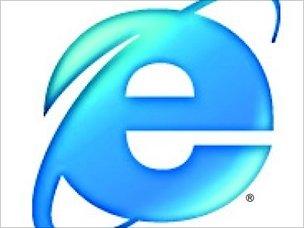Clicking the blue 'e'
- Published

Should it have been called Web Explorer?
Bill Thompson remembers the launch of Microsoft's web browser but struggles to forgive some of its faults.
In August 1995 Microsoft released Windows 95, a radically redesigned operating system that replaced Windows 3.11 and offered a significantly improved user interface and easier access to internet services.
The main innovation was that Windows 95 was a complete operating system and not merely a graphical user interface running on top of DOS, Microsoft's older (and non-graphical) OS.
I remember the day it was released because I was working at The Guardian, where I was in charge of their nascent website and embroiled in discussions about how online publication on the web would change the dynamics of the newspaper business and affect the way journalism worked.
Unsophisticated
We used Macs in the office, of course, and the server on which I was building the website ran Unix because we needed a serious operating system to support our programming tools and serve the hundreds of visitors we attracted.
But I had a Windows computer at home, and I bought Windows 95 the day it came out, along with the "Plus! pack" of extra goodies.
This selection of add-ons included desktop themes, some games and the earliest release of Internet Explorer, Microsoft's very own web browser.
Website design in those days wasn't very sophisticated. All our pages were simple HTML documents, and we generally assumed that site visitors used Netscape Navigator, the successful browser based on NCSA Mosaic, the first graphical web browser.
However it was clear that Microsoft's entry into the browser market would have an impact, and I needed to know what our sites would look like in this new environment.
At the time pages were not complicated enough for there to be any real difference, but it wasn't long before the lack of standards-compliance by the major browsers and their continuing practice of installing 'extensions' that let site developers do cool things like use tables or have scrolling text rapidly became a source of irritation, annoyance and massive amounts of extra work.
Sadly, as any developer will tell you, it still is.
Browser wars
Although the first release of IE was an important landmark for the web, the code was really just a rewritten version of another browser, Spyglass Mosaic, and the browser itself was just another application that ran under Windows. Microsoft was playing catch-up in the internet world, having put most of its effort into the development of its own private Microsoft Network.
That changed in 1997 when Internet Explorer 4 was released. The launch marked the start of the 'browser wars' between Microsoft and Netscape, largely because IE4 was closely integrated into the underlying Windows operating system, impossible to remove and shipped as standard with Windows.
This made it very hard for competing browsers, and was a major factor in Microsoft achieving over 90% market share between 2000-2005.
That share is now declining, partly because the European Commission prosecuted Microsoft over its aggressive practices and has forced the company to offer users a genuine choice of browser, but mostly because there are other browsers out there to choose from and many people prefer the experience of using Opera or Firefox.

IE helped Microsoft achieve over 90% market share
Not everyone has the choice, of course, and many business computer users are stuck with out of date and insecure older versions of the browser because their employers have developed applications that only work with them.
This is even true inside the UK government, which recently announced that it was sticking with IE6, released back in 2001, despite a six thousand strong petition to 10 Downing Street, and even though Microsoft itself asks everyone to upgrade to IE8 the newest release, because the cost of migrating was seen as too high.
In its response the government argues that it is "more cost effective in many cases to continue to use IE6 and rely on other measures, such as firewalls and malware scanning software, to further protect public sector internet users."
This is a very dangerous viewpoint, and ignores the fact that having to use an old browser means that modern services and websites may be unavailable or not work properly, cutting civil servants and even ministers off from the digital world they are supposed to be embracing.
But that will change over time, simply because the cost of running old unsupported code rises quite quickly, and even a cost-conscious government will see that it makes sense to move to a newer technology.
Over the years Internet Explorer has been the butt of many technology jokes, the browser equivalent of the Lada car back in the 1980s when the build quality was much poorer than it is today. But we should not ignore its positive impact.
When Microsoft released its own browser it validated the web in a way that the technical community could not do.
I can even forgive Microsoft for the security flaws in its browser code and even for the savagery of its attack on Netscape, since the desire to build a better browser than IE inspired the development of Opera and Firefox and have given us all a better online experience.
However some things are unforgivable, and the decision to call its web browser 'Internet Explorer' is one of them.
It is surely one of the reasons why so many users still confuse the internet, a global network of connected computers, and the world wide web, an application that generally uses the internet to move data around.
Making millions of ordinary computer users think that pressing the blue 'e' would connect them to 'the internet' rather than let them view web pages was one of Microsoft's biggest mistakes, and it still annoys me fifteen years later.
Bill Thompson is an independent journalist and regular commentator on the BBC World Service programme Digital Planet. He is currently working with the BBC on its archive project.